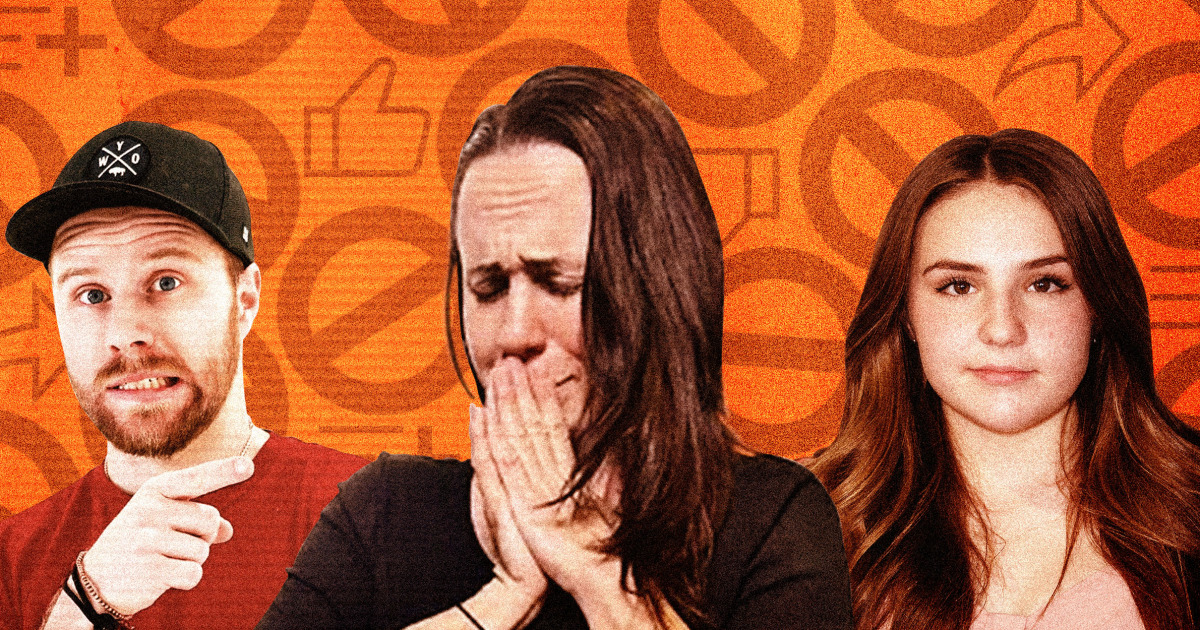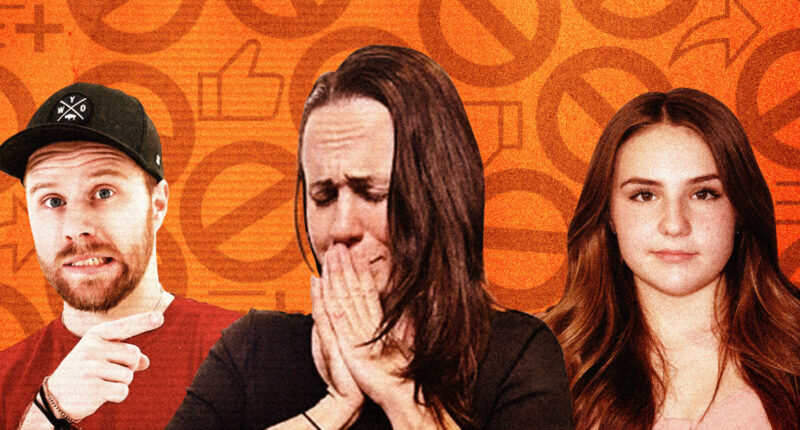
The mother of a teen YouTube star will face claims of emotional, physical and sexual abuse from 11 teen content creators who were featured on her daughter’s channel in a trial that starts Monday.
The court proceedings will offer a rare glimpse into the lucrative and largely unregulated world of child YouTube stardom.
All of the teen plaintiffs allege in the complaint, filed in January 2022, that Tiffany Smith, the mother of YouTube star Piper Rockelle, intentionally inflicted emotional distress while she held a position of “care and control” over them in the production of content for Rockelle’s YouTube channel. The teen creators allege that they endured physical and emotional injuries from “harassment, molestation, and abuse,” according to the complaint.
In addition, some of the plaintiffs say they weren’t compensated for the use of their likenesses to promote Rockelle’s content, and all of them say they weren’t paid for their work and appearances, though they say they weren’t promised payment.
Some of the allegations against Smith have repeatedly piqued interest of concerned outsiders, offering a glimpse into the “Wild West” world of YouTube child stardom.
YouTube itself doesn’t take responsibility for the offscreen conduct of its creators, and there are surprisingly few regulations around the creation of social media content involving children. Instead, the teens are each asking for roughly $2 million in damages, totaling at least $22 million, from Smith and her boyfriend, Hunter Hill, who the complaint identifies as the director and editor of Rockelle’s YouTube channel.
The plaintiffs were all once a part of 15-year-old Piper Rockelle’s “Piper Squad,” and were featured on her YouTube channel, which has over 10 million subscribers. Children and young teenagers make up the cast of the “Squad,” and their relationships and antics are broadcast to millions of viewers. Despite their age, the plaintiffs said they were asked to stage romantic “crushes” on each other, meant to fool young audiences.
According to the complaint and former “Squad” members’ mothers, six of whom talked to NBC News, the dynamics of the “Squad” and romantic storylines have led to issues like online bullying and harassment of their children. The complaint and the mothers say Smith has left their children reeling from trauma.
“I just want peace back with my kids,” said Ashley Anne-Rock Smith, whose two daughters, both plaintiffs, are Rockelle’s cousins and appeared in 94 videos on her channel.
“I want all predators who hurt young kids to be brought to justice,” she said. “I also hope we move the needle on these platforms that are allowing this.”
YouTube did not immediately return a request for comment.
In July, Smith countersued for $30 million and accused the plaintiffs’ mothers of conspiring to extort money by making false sexual abuse allegations. Smith voluntarily abandoned the lawsuit before the mothers responded, and Matthew Sarelson, one of the attorneys representing the plaintiffs, called the lawsuit “baseless.”
An attorney for Smith did not respond to a request for comment. In an interview with the Los Angeles Times published in December, Smith said she didn’t consider herself the plaintiffs’ employer at the time the videos were filmed with Rockelle. Smith has since acquired a permit to work with minors, she told the Times.
Smith is accused of child abuse and retaliation
In the 147-page complaint, the plaintiffs described Smith as a “mean-spirited control freak” and alleged she made comments about children’s genitalia, shouted obscene and sexually graphic remarks at them, encouraged them to be “sexy” and “sexually aggressive” in videos, and inappropriately touched the children on their legs, thighs and buttocks. One plaintiff said Smith told her she was mailing Rochelle’s underwear to a man who liked to “sniff” it.
“As children, they don’t understand it, sometimes it goes over their heads,” said Steevy Areeco, the mother of another plaintiff. “But now they’re older and they’re starting to understand the trauma that was caused, the things that were said to them, these fake crushes.”
Areeco and some of the other parents and plaintiffs had experience in traditional media before joining the “Squad.” Sarelson, the attorney, told NBC News that the guidelines for child actors on TV and movie sets don’t apply for nontraditional filming environments, like YouTube. Areeco said that the “Squad” wasn’t acting, since Smith wanted “real reactions” from the children and would “force them to live these adult situations they shouldn’t have been put in.”
“We all love YouTube and it’s a great place, but when somebody is using it as a business and pulling other children in, those people should have to uphold a certain standard,” Areeco said. “We want there to be protections for the children.”
YouTube demonetized Rockelle’s channel in February 2022, after Insider sent the platform a request for comment about the lawsuit filed against Smith. That means the channel no longer makes money from ads. Rockelle makes money by selling merchandise and is currently on tour in the U.S. to perform music and meet fans.
According to the lawsuit, in addition to not getting paid, nine of the plaintiffs alleged that Smith and Hill “sabotaged” their YouTube channels after they left the “Squad” by falsely flagging their content as inappropriate and embedding their content on pornographic websites so they would be “deemed ‘restricted’” by YouTube. The nine plaintiffs said Smith and Hill owe them at least $2 million in lost earnings from YouTube.
“They lost their childhood,” Sarelson said of his clients. “Several of my clients have removed themselves from the world of social media because they had this bad experience.”
How social media stars avoid legal accountability
Even before the lawsuit was filed, Smith and the parents of former “Squad” members pursued legal action against each other, and Rockelle became part of tabloid headlines.
In September 2021, YouTube removed three of Rockelle’s thumbnail images for violating its Child Safety Policy shortly after the singer P!nk tweeted that Rockelle was being “exploited” by her mother. At the time, both Rockelle and Smith responded that there was nothing wrong with the photos, with Smith telling outlets through a representative that she wanted to “protect” and support her daughter.
In April 2020, Smith sued one “Squad” parent who isn’t a party to the current lawsuit for defamation. The case was later settled, but in an August 2020 court filing, a content creator named Raegan Fingles signed a declaration accusing Smith of giving him alcohol and aggressively kissing him while livestreaming when he was 17. An attached exhibit contained a screenshot of the moment on the livestream. Fingles told the Los Angeles Times that the FBI interviewed him about the incident in June. In response to the Times, Smith acknowledged the kiss happened, but said the incident had been “greatly blown out of proportion.”
The FBI did not immediately return a request for comment.
As the dispute between Smith and the parents of former “Squad” members winds up in court, the genre of YouTube content involving child influencers has only grown in popularity.
Catalina Goanta, an associate professor in law and technology at Utrecht University in the Netherlands, has researched child influencers around the world and said the industry has boomed as more forms of monetization become available, like advertising revenue, merchandising, live events and sponsorships. Still, there are few forms of protection for the child stars of YouTube.
“You can have the production of Disney channel, starring your child, in your home,” Goanta said. “We have rules for child labor, especially entertainment labor. Now we need to expand that to be applicable to the activities of children in the intimacy of their home.”
Attorneys for the plaintiffs said that, first and foremost, they hope to get their clients compensated for their work and for the turmoil they say the teens experienced after joining the “Squad.” But as to whether this case will cause a ripple effect in the child influencer industry leading to more significant change? They’re unsure.
One outcome that some advocates would like to see is for California to re-examine legislation that pertains to child performers, such as the Coogan Law, which affirms that earnings by minors in the entertainment industry are the property of the minor, not their parents, according to the industry union SAG-AFTRA. The law also requires parents to put 15 percent of a child’s earnings into a blocked trust account, often called a Coogan Account. If the law were to be re-examined, experts and plaintiffs hope it would be adjusted to include children who make content on social media regardless of whether they’re under contract or belong to a guild like SAG.
The issue, Sarelson said, is that a Coogan Account wouldn’t apply to his clients because his clients weren’t paid for their time in the “Piper Squad.”
“It’s a highly unregulated, Wild West environment. There’s potential for misconduct and abuse throughout the industry,” Sarelson said. “You would hope the California Legislature would investigate and take some action to make some changes, some modifications to the law.”
In the meantime, the plaintiffs hope that Smith faces consequences for her actions. Jennifer Bryant, mother of one of the plaintiffs, put it plainly: “My goal is that Tiffany Smith never works with a child again.”
Source: | This article originally belongs to Nbcnews.com









